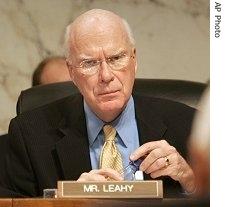2007年VOA标准英语-Bush, Congress Locked in Legal Battles(在线收听)
Capitol Hill
10 July 2007
As he faces renewed pressure from Congress over the war in Iraq, President Bush and majority Democrats are also locked in legal battles involving other issues. VOA's Dan Robinson reports from Capitol Hill, where the standoff between the president and key House and Senate Democrats continues in advance of important hearings this week and later this month.
On two issues, the firing of nine federal prosecutors, and the president's commuting of the prison sentence of former White House aide Lewis Libby, the war of words continues with no end in sight.
On the attorneys matter, the president refuses to allow key former aides testify to congressional panels, and is resisting congressional subpoenas for documents lawmakers believe are relevant to their efforts to determine if the Bush administration employed improper political considerations in dismissing U.S. prosecutors.
Through the White House counsel, the president asserts Executive Privilege, an authority that has been the subject of controversy over the decades, in which presidents have declined to produce documents or allow testimony of key officials.
 |
| Senator Patrick Leahy |
He convenes his panel Wednesday, and a House judiciary panel under Congressman John Conyers will do the same on Thursday.
Former White House counsel Harriet Miers and former political aide Sara Taylor may appear, and if they do are likely to cite the Executive Privilege claim in refusing to answer questions.
White House spokesman Tony Snow reiterated (on Monday) the president's reasoning in refusing congressional requests. "There does have to be, for politicians who have very difficult jobs, the ability to get honest counsel from people who are working for them. That is all this is about. This is not about trying to throw a big smoke cloud over how the government works," he said.
Answering questions this week, Snow maintained that the White House tried to accommodate Congress, by earlier providing thousands of documents and offering testimony, although behind closed doors and without transcripts.
Senator Leahy and Congressman Conyers call White House explanations overly broad, and as both make clear, they could cite the White House with contempt of Congress.
"It is apparent that this White House is contemptuous of the Congress [and] it feels it doesn't have to explain itself to anyone, not to the people's representatives in Congress but worse yet not to the American people," the senator said.
Congressman Conyers, meanwhile, holds a hearing Wednesday on President Bush's commutation of the jail sentence of former White House aide Lewis Libby, who received two years in prison for obstructing justice in a federal probe involving the leak of a CIA officer's identity.
Conyers wants President Bush to waive any Executive Privilege claim regarding testimony by aides or documents in that matter, with the lawmaker seeking to find out among other things whether Libby's former boss, Vice President Dick Cheney, had a role in the commutation.
Against the backdrop of these political dramas, another controversy returned to the headlines, in a Washington Post report Tuesday concerning President Bush's once secret warrantless domestic surveillance program.
The newspaper said Attorney General Alberto Gonzalez failed to give the Senate Judiciary Committee accurate information about when he first learned of abuses by the FBI of guidelines for National Security Letters, used by the government to obtain information.
Senator Leahy calls the report, in his words, another example of the Administration's troubling pattern of misleading or stonewalling Congress and the public.
Leahy says he intends to pursue the matter further with Gonzalez who has been called back to Capitol Hill for more testimony later this month.